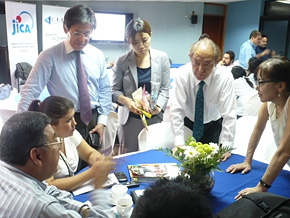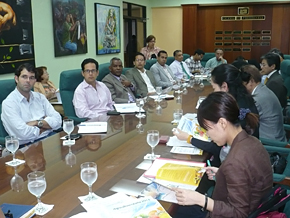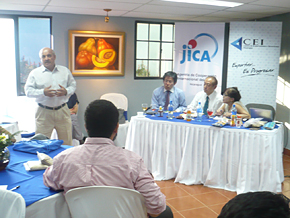Visits to the Dominican Republic and Nicaragua A follow-up survey by JICA (Feb. 2 to Feb. 15, 2013)- PREX Island
PREX Members
Visits to the Dominican Republic and Nicaragua A follow-up survey by JICA (Feb. 2 to Feb. 15, 2013)
PREX was commissioned by JICA Kansai to conduct the Capacity Development for Promoting Trade Between Central America (Caribbean Region) and Japan from fiscal 2006 to 2011, and it carried out support for the promotion of exports of the various Central American countries through its six years of seminars. Five companies from that region set up booths at FOODEX JAPAN, Japan’s biggest trade fair for food products, in fiscal 2011. Specific accomplishments were seen, such as the appearance of companies that made skillful progress in business discussions held afterward. Fiscal 2011 marked the end of the seminars held in Japan, although the seminar participants who have since returned home continue to provide assistance to companies.
A local follow-up for the seminar took place in March 2012. Specialists and staff members from JICA and PREX made the trip to the Dominican Republic and Nicaragua. They have gotten a handle on the achievements made to date and the situational problem points, and they have made proposals.

At the Center for Export and Investment, Nicaragua. Guidance is provided by instructor Eiichi Ueda (second from right) and Ryuji Nishi (fourth from the right), who served as course leaders in the seminars in Japan.
Activities of seminar participants since returning home
Of the nine former seminar participants now back home in the Dominican Republic, five belong to the Dominican Republic Export & Investment Center (CEI-RD). In 2011, mainly participants who had returned home and in the CEI-RD formed ties with the JICA office in the Dominican Republic, the Japanese Embassy in that country, the Dominican Association of Exporters (ADOEXPO) and Cluster del Mango Dominicano (PROMANGO), and in order to promote participation in the Japanese market by local companies, they formed a working team. As an achievement by the working group of providing information related to the Japanese market through regularly scheduled meetings and large-scale seminars with local companies, five companies of the Dominican Republic were approved in the selection to run a JETRO booth for FOODEX JAPAN 2013, Japan’s largest trade show for food products. Four of them set up booths. Furthermore, in Nicaragua as well, four of the seminar participants who returned home and were working at the Center for Export and Investment in fiscal 2012 applied and were chosen for a promotional follow-up program to support voluntary activities of participants who are home from JICA seminars. Using the expenses of the follow-up effort, they are drafting a pamphlet and giving traveling lectures to product producers in order to provide information to local companies.
As for the latest follow-up efforts, we were kindly accompanied by Eiichi Ueda and Ryuji Nishi, who served as course leaders for six years in the seminars in Japan. Along with grasping the accomplishments of the seminars held in Japan, they implemented the efforts with the aim of giving advice so that voluntary activities by former seminar participants in their home countries could continue.
Implementing seminars for local companies
Seminars were implemented for local companies, in addition to observation tours of these companies and plantations in the Dominican Republic and Nicaragua. This time in particular, a seminar lasting two days was held in the Dominican Republic, which had decided to exhibit at FOODEX JAPAN 2013. On the first day of the seminar, approximately 50 companies that had a high level of interest in the Japanese market were targeted, and in attendance were producers of ginger, cacao, coffee, mangos, etc. On the second day, a seminar was held only for companies planning to exhibit at FOODEX, including one producing rum, one avocado purée, and two coffee. In the morning instructors Mr. Ueda, Mr. Nishi and Nishizawa of JETRO gave lectures on the points to remember when conducting business with Japanese companies, how the booths at the trade show should be decorated and dealing with customers at the booths. Later, in the afternoon, a role-play was held with a mock booth, and then review was conducted on the content learned during the morning. With the mock booth, Mr. Ueda, Nishi and the former seminar participants took on the role of buyers, and various questions were fielded to the exhibiting companies. The pair kindly provided wide-ranging advice in order to make exhibiting at FOODEX JAPAN a success. Mr. Ueda pointed to an insufficient amount of materials for distribution to the buyers, and Mr. Nishi said the comments explaining the products were too abstract.
Toward entering the Japanese market
There are many issues that the Dominican Republic and Nicaragua must overcome for entering the Japanese market. Issue number one is raising the competitiveness of their products. When we consider exports to Japan, many of the products in the Central American region compete with those from Southeast Asia. As the region is geographically far from Japan, the transportation costs will rise, making competition on price a struggle. In order to bolster the products’ competitiveness, it will be necessary to raise the level of their added value from the non-price aspect. Companies will require the nurturing of human resources able to carry out the appropriate leadership for PR methods for the products, acquisition of organic certifications, product design, packaging technologies, etc.
If we take mangos produced in the Dominican Republic, for instance, much of this fruit is produced in Southeast Asia. In the case of fresh mango, transport by air from the Dominican Republic to Japan will lead to higher costs. Thus, it will be necessary to study product strategies so that the fruit can be sold at even higher prices.
Issue number two is the establishment of national brands. Both the Dominican Republic and Nicaragua are countries still unfamiliar to the Japanese. It will be important to create brand strategies in order to for the countries to receive recognition from consumers. In the Dominican Republic, there has been a tie-up with the tourism agency, and they are doing studies on PR on behalf of the country. In the future, we can expect to see continuous activities as a variety of organizations and links are deepened toward the establishment of national brands.

An exchange of opinions on branding strategies takes place at the Dominican Republic Export & Investment Center.
FOODEX JAPAN 2013: 4 companies from the Dominican Republic take part
FOODEX JAPAN 2013 was held approximately two weeks after the follow-up activities. The four companies managed to hold their exhibits without any major troubles or incidents. The buyers also had positive evaluations, and many requests to send samples and estimates were received. In the near future, seminar participants who have returned home and exhibiting companies will link up and conduct follow-ups on the requests that were made to the companies.
Seminar participants who returned home to Costa Rica and Guatemala also take part in FOODEX JAPAN
The latest follow-up activities involved trips only to the Dominican Republic and Nicaragua. However, former seminar participants who have returned to their home countries of Costa Rica and Guatemala also participated in FOODEX JAPAN 2013, at booths run by JETRO. Arianna Tristan of the Export Promotion Agency of Costa Rica (PROCOMER), who attended a seminar in fiscal 2008, came to Japan this latest time. Having received advice from a JICA senior volunteer, PROCOMER has been tackling the promotion of exports to Japan for the last several years. In the latest show, four companies from Costa Rica exhibited, and Mr. Arianna participated in FOODEX as a coordinator. Mr. Victor, CEO of AGROINDUSTRIA LEGUMEX, which produces and sells frozen vegetables and fruit in Guatemala, has run a booth since last fiscal year. Since then, he has had steady successes, such as the start of business deals with Japanese companies.
Their visits to Japan ware over, but former seminar participants have given us the impression of being a seminar participant whose passion even now continues ceaselessly. I think that business with Japanese companies, which demand the world’s highest standards of quality, presents various hurdles that need to be surmounted. But I hope that they prevail by not giving up and striving ahead. Finally, I would like to again express my gratitude to instructors Mr. Eiichi Ueda and Mr. Ryuji Nishi for their leadership during six years of seminars in Japan and for the most recent follow-up activities.

Seminar participants who have returned home present their experiences from FOODEX, at the Center for Export and Investment, Nicaragua.
- Date : February 15, 2013
- Name : Kei Kitamura, International Department


